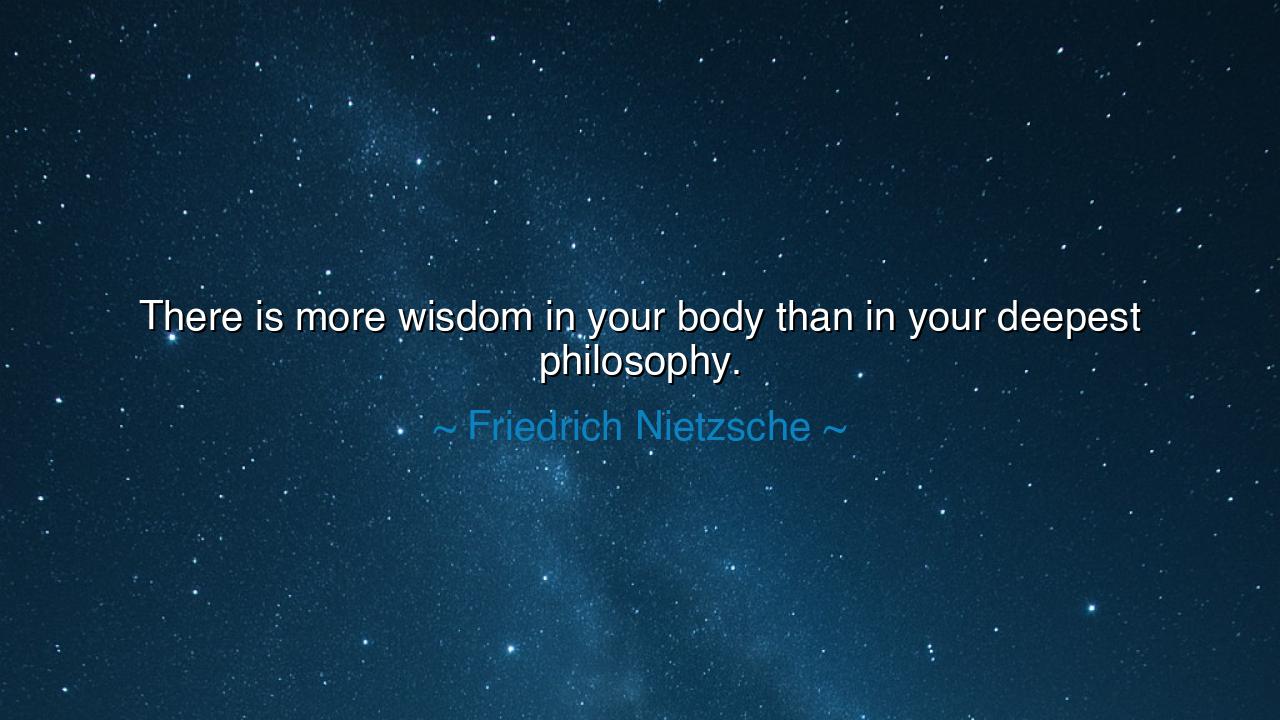
There is more wisdom in your body than in your deepest






“There is more wisdom in your body than in your deepest philosophy.” These powerful words of Friedrich Nietzsche call us to a profound understanding of human existence, urging us to look beyond the intellectual and abstract to the very foundation of life itself — our bodies. For in our bodies lies a wisdom older than philosophy, a wisdom that connects us to the world in ways that words and theories can never fully capture. The body, with its instincts, its movements, and its sensations, carries the knowledge of life that cannot be reasoned into existence, but is felt deeply and innately.
The ancient Greeks understood this truth well. The body, to them, was not simply a vessel for the mind, but a temple of knowledge. Hippocrates, the father of medicine, believed that the body’s natural processes and reactions held clues to the deeper truths of health, balance, and life itself. He said, “The body is a source of wisdom, for it knows how to heal itself.” This idea resonated through the ages, for it suggests that the body has an innate understanding of the natural world and its needs, far beyond what any philosophical system could articulate.
Consider the story of Leonardo da Vinci, whose genius was not confined to intellectual pursuits but was embodied in his deep connection to the body. As an artist and anatomist, da Vinci sought to understand the body not just through observation, but through experience. His studies of human anatomy were driven by the belief that true wisdom could be found in the form and function of the human body, and that only by understanding its inner workings could one fully appreciate the complexity of life. His drawings of muscles, bones, and tendons were not just scientific endeavors, but expressions of the profound wisdom he saw in the body, a wisdom that transcended abstract thought.
Nietzsche’s words also speak to the wisdom of instinct and intuition, forces that arise from deep within the body. The philosopher often praised the body’s natural inclinations, arguing that they were closer to the truth of life than the intellect, which could become tangled in doubt and contradiction. Wisdom does not always come from careful reasoning, but from the body’s response to the world — the gut feeling, the impulse to act, the recognition of beauty and truth in a single glance. The body moves us without the need for logic; it simply knows, and in that knowing is the purest form of wisdom.
In more recent times, Mahatma Gandhi embodied this wisdom through his commitment to nonviolent resistance. Gandhi’s body bore the scars of his beliefs — the fasting, the marches, the disciplined actions — and his connection to his body was inseparable from his philosophy. The wisdom of his resistance was not just in his words, but in the way he embodied his principles through his actions. His body was both a vehicle for his philosophy and a reflection of his deepest truths, proving that the body holds wisdom that can guide not only the individual but the world.
Thus, Nietzsche’s words remind us that wisdom is not solely a matter of intellectual reflection but is rooted deeply in our very beings. The body, with all its sensations, instincts, and movements, knows truths that the mind cannot always grasp. True wisdom, as the ancients understood, comes when we listen to the body, trust its wisdom, and honor it as a guide through life’s most profound mysteries.






BSBa Son
I find this idea both humbling and liberating. It makes me question whether we overvalue abstract reasoning in our education and culture. Could embracing bodily wisdom lead to more authentic living, deeper creativity, and better decision-making? How might someone train themselves to recognize and interpret subtle bodily cues as meaningful guidance, rather than dismissing them as mere instinct or reflex?
DDarkUser25
I’m curious about the implications for health and well-being. If the body knows more than philosophy, does ignoring bodily signals contribute to poor choices or stress? How can we learn to trust physical sensations like fatigue, hunger, or emotional tension as valid sources of insight rather than obstacles to rational thought? I’d like examples where listening to one’s body led to profound clarity or transformative decisions.
QCQuynh Chi
This quote raises questions about the relationship between mind and body. If the body holds wisdom, does that mean philosophical reflection is limited without experiential grounding? Could it be that our theories and abstract knowledge only become meaningful when integrated with what we sense and feel physically? I’d love to explore ways to better harmonize intellectual and bodily understanding in daily life and creative pursuits.
LDNguyen Linh Dan
I feel intrigued but also challenged by the notion that physical experience might surpass philosophical thought. Does this suggest that true understanding comes from lived experience rather than abstract reasoning? How might practices like meditation, physical training, or mindful movement help us access this innate bodily wisdom? I’d like perspectives on how different cultures recognize and honor the intelligence of the body in decision-making or problem-solving.
TDThuy Duong
This makes me reflect on the idea that our bodies can convey knowledge that the mind alone cannot grasp. Could instincts, intuition, and bodily sensations hold insights deeper than logical reasoning? I wonder how much modern life, with its emphasis on intellect, neglects this embodied wisdom. How can we cultivate awareness of what our bodies are telling us without dismissing it as mere feeling or impulse?